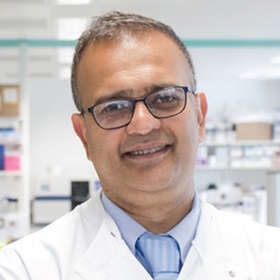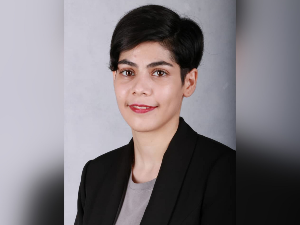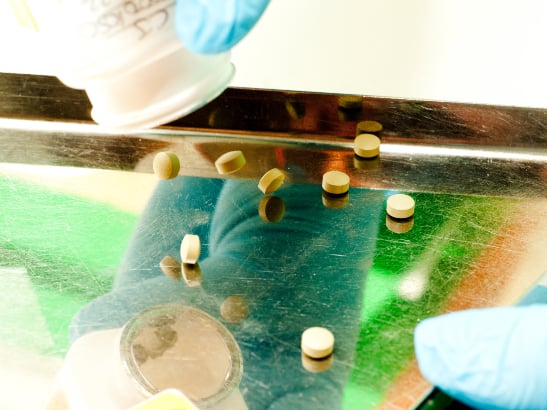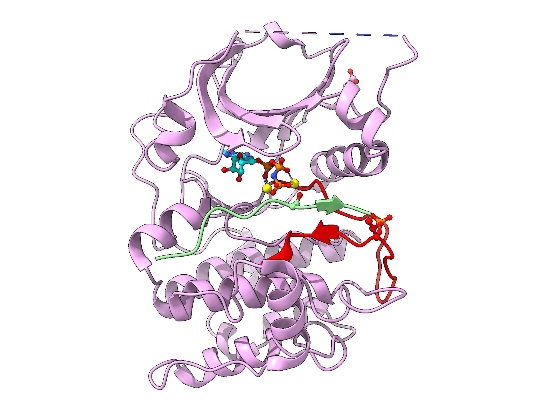Clinical Pharmacology Adaptive Therapy Group
Professor Banerji's group aims to study re-wiring of signal transduction to understand and overcome mechanisms of drug resistance and, in addition, to understand exploit cancer evolution using pharmacological tools.
We are focused on the re-wiring of signal transduction using established cell lines to control mechanisms of drug resistance and comprehend the evolution of cancer.
Rewiring of signal transduction
This group is working on the set-up and validation of a highly sensitive antibody-based assay on the Nanostring platform which will allow quantification of 50 - 100 phosphoproteins/proteins. It plans to digest tumour tissue obtained during surgery or from biopsies and expose them to a matrix of 20 - 30 anticancer drugs before obtaining phosphoproteomic data.
It also aims to use organoids and patient-derived xenografts to take this forward. The proteomic data will be modelled with the Computational Biology and Chemogenomics Team led by Professor Bissan Al-Lazikani. The group also supports PhD students studying the re-wiring of signal transduction in colon cancer and the role of stroma in influencing signal transduction.
The group also currently works with Professor Andrea Sottoriva at the Centre for Evolution and Cancer at the ICR to look at barcoding of cancer cells and the study of evolutionary trajectories of clones under experimental conditions. It is also studying mechanisms of resistance, collateral drug sensitivity and resistance of these emergent clones.
The primary area of this group is focused on the re-wiring of signal transduction using established cell lines as well as fresh cancer cells derived and isolated from patients and then exposing them to novel anticancer drugs. Pre- and post-proteomic profiling provides insights into mechanisms of drug resistance and how to overcome this with combination therapies. The initial work was carried out using cancer cells isolated from ascites and pleural effusions; the group in now developing expertise in organoid and patient-derived xenograft tissue.
The group develops its own antibody-based proteomic platforms and collaborates with teams involved in mass spectroscopic methods, led by Jyoti Choudhary. The group generates significant amounts of data and collaborates with the ICR's Computational Biology and Chemogenomics Team led by Professor Bissan Al-Lazikani to develop and decipher the data.
The secondary focus of this lab is the study of the pharmacological effects on cancer evolution in experimental models and methods to quantify this and herd cancer cells to a vulnerable state.
Professor Banerji works with Professor Andrea Sottoriva in the Centre for Evolution and Cancer at the ICR and plans to translate these concepts in to the clinic.
Professor Udai Banerji
Group Leader:
Clinical Pharmacodynamics Biomarker Group, Clinical Pharmacology & Trials, Clinical Pharmacology Adaptive Therapy Group
Professor Udai Banerji champions multidisciplinary working at the interface between early phase clinical trials, drug discovery and translational research related to drug resistance. He is Deputy Director of the Drug Development Unit at The ICR and Royal Marsden, and as a key member of the Centre for Cancer Drug Discovery, also heads the Clinical Pharmacodynamics Biomarker Group and the Clinical Pharmacology-Adaptive Therapy Group.
Researchers in this group
Professor Udai Banerji's group have written 139 publications
Most recent new publication 1/2025
See all their publicationsVacancies at the ICR
Working at the ICR
Head of Biology and Director, Centre for Target Validation (Group Leader)
Under the leadership of Dr Olivia Rossanese, we are seeking to appoint a Team Leader to join The Centre for Cancer Drug Discovery (CCDD) as The Head of Biology and Director of the Centre for Target Validation. Key Requirements The successful candidate must have in-depth knowledge and recent experience in an area of cancer biology relevant to oncology drug discovery. Leadership experience of drug discovery within, or in collaboration with, the pharmaceutical or biotechnology industry as evidenced by publication and/or successful commercial projects. Along with completing the online application form, you will be asked to attach the following documents and failure to do so will mean your application cannot be considered on this occasion: · Full CV · Lists of major publications, achievements, research grants, distinctions. · A PDF of a maximum of five key publications, or other research outputs (e.g. patents) that best demonstrate previous productivity · You must also complete the personal statement section of the application form in the format of a covering letter including the names and contact details of three academic referees Department/Directorate Information: The Division of Cancer Therapeutic's mission is to develop personalised medicines by translating information from the cancer genome and cancer biology into drugs for patient benefit. We implement innovative drug discovery technologies, discover novel mechanism-based drugs, and develop these as rapidly as possible from the laboratory through to hypothesis-testing early clinical trials We encourage all applicants to access the job pack attached for more detailed information regarding this role. For an informal discussion regarding the role, please contact Dr Olivia Rossanese, Email [email protected]
Human Resources Adviser
We currently have an exciting opportunity for a self-motivated and experienced HR Adviser to join our HR Operations team. Providing dedicated partnering with client departments, you’ll work closely with line managers to provide proactive and pragmatic advice and guidance on all aspects of people management, taking ownership of a busy employee relations caseload. You will also be responsible for supervising the work of our HR Administrative Team to ensure our monthly payroll input is submitted accurately and on time. You will work closely with other HR teams, including Recruitment, Systems and Information, and Learning and Organisational Development to ensure the provision of an effective, end to end HR service to Scientific and Professional Services teams across the ICR. Key Requirements You will have previous HR advisory experience, as well as a sound experience of managing employee relations cases end-to-end. You’ll need to be highly computer-literate, and have excellent attention to detail, with strong organisational and prioritisation skills to deliver effectively within a fast-paced environment. You will also have first-rate customer service skills to build and maintain collaborative relationships with colleagues across the organisation. Previous line management experience, and of managing small scale team restructures, including knowledge and understanding of TUPE processes would be a distinct advantage. Human Resources Directorate We know that talented, brilliant, passionate people lie at the heart of the ICR. That’s why we provide the policies, procedures, systems and people management infrastructure to recruit, retain, motivate and develop our people to achieve their full potential. We offer both operational and strategic support to teams across the ICR. We are organised across four main functions: HR Operations Learning and Organisational Development Pensions Reward, Information and Systems The ICR’s future success depends on recruiting the very best people with the very best skills and our HR strategy ensures that we have the organisational capacity and capability to deliver this. We encourage all applicants to access the job description pack attached for more detailed information regarding this role. For an informal discussion regarding the Sutton based role, please contact Karen Grieff via email on [email protected].

Employee Story
Dr Fatemeh Ahmadi Moughari is a bioinformatician working in the Functional Genomics Team, led by Rachael Natrajan, and the Bioinformatics Team, led by Syed Haider. She joined the ICR from her home country of Iran where she completed her PhD in anti-cancer drug response at Shahid Beheshti University.
"I really enjoy the multidisciplinary atmosphere here and it’s the thing that stood out when I first joined the ICR."
Industrial partnership opportunities with this group
Opportunity: A potent, orally bioavailable clinical-stage inhibitor of MPS1 with potential as a treatment for a range of cancer types including triple negative breast cancer
Commissioner: Swen Hoelder
 .
.



